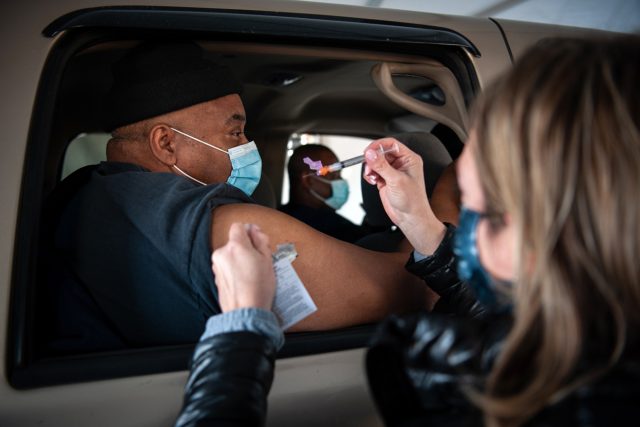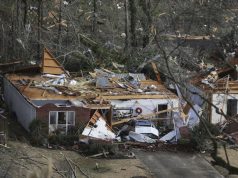
By Rowaida Abdelaziz
Black Voices
As the nation anxiously awaits for COVID-19 vaccines to be made available to more of the population, experts and activists are becoming increasingly concerned that the vaccines won’t reach marginalized communities.
Black Americans continue to be hospitalized with COVID-19 at higher rates than other racial or ethnic groups, according to the Centers for Disease Control and Prevention. But a new study, released last week by the Kaiser Family Foundation, found that Black Americans are getting vaccinated against COVID-19 at lower rates than white Americans — widening the racial disparities during the pandemic.
President-elect Joe Biden also vowed on Monday to provide equitable vaccine access to Black and brown communities as a part of his national vaccination strategy. Biden’s plan includes setting up federally supported vaccination centers in high-risk, medically underserved areas and administering the vaccine at no cost.
“COVID was the first time that a lot of people realize what health disparities were and that they’re real,” said Debra Furr-Holden, an epidemiologist and the associate dean of public health at Michigan State University.
“Why would our mentality or trust in the medical system have shifted during a pandemic? If anything, our skepticism would have been heightened,” she added.
Contending With Racism In Public Health
Black and Asian Americans are among the most hard-hit communities — many of whom disproportionately work frontline jobs, have preexisting health conditions, or are unable to isolate or work from home due to their socioeconomic status.
Yet despite the high rates of infections and deaths, vaccine hesitancy remains high among Black Americans. According to a December 2020 study from the Kaiser Family Foundation, half of Black adults said they probably or definitely will not get vaccinated because they don’t trust vaccines or are worried about possible side effects.
The lack of trust between Black Americans and the medical world is not unfounded. Systematic discrimination in the medical health world continues to prevail, from the legacy of the Tuskegee study in 1932, where Black men were left untreated for syphilis for research purposes, to modern-day maternity mortality rates that show Black women are more likely to die from pregnancy-related complications.
The pandemic only exacerbated those concerns. It also shone a harsh light on the racial and socioeconomic disparities that leave Black Americans more susceptible to contracting the coronavirus to begin with.
The disproportionate occupational exposure faced by Black Americans stemmed from wealth inequalities that then gave rise to health inequalities, explained Furr-Holden.
“If you’re poor, the stay-at-home order falls on deaf ears. How can you stay at home if you can’t feed your family?” said Furr-Holden.
Vaccinations are just one part of the “Swiss cheese” pandemic defense model referenced by health experts. The model posits that no single intervention will prevent the spread of the virus, but rather multiple layers of protection.
That means focusing on wearing masks, practicing social distancing and vaccines on an individual level, and then moving onto “more of the societal and the systemic, and the governmental support” like payroll protection, unemployment insurance, barrier-free testing, and support for people unable to rent and bills, said Furr-Holden.
African Americans, who are already overrepresented in high-demand, low-wage positions who may not be considered essential workers, will continue to be disproportionately vulnerable to the virus so long as those social determinants are left unaddressed.
Additionally, it is critically important to empower African Americans with information about the vaccine in order to overcome the skepticism caused by the decades of trends of racism in public health. Furr-Holden, who has been hosting weekly Q&As on Facebook, emphasized the importance of accessible, credible information and self-empowerment. People will then make good choices, she said.
“We need trusting, credible messengers, not to tell people to take the vaccine, but rather to give them the information that they need to make an informed decision and be empowered with that choice. Knowledge is power,” she said, adding that the current information is confusing and not written in a way for the masses to understand.
The Risk Of Invisibility
The lack of clear data documenting the impact of the coronavirus pandemic on Asian Americans and Pacific Islanders (AAPI) has left experts concerned about whether or not proper resources and information are reaching this community.
Gilbert Gee, a professor in the department of community health sciences at the Fielding School of Public Health at the University of California, Los Angeles, said Asian American populations might be overlooked due to the “model minority” myth — a narrative that perceives members from Asian backgrounds are successful, productive and thriving individuals who do not need assistance or social services.
These stereotypes and the risk of invisibility, which may have led to the conflicting data, can also endanger the wider community if they are presumed to be shielded from the impacts of the pandemic. That invisibility also means funds, resources and critical information about the vaccine aren’t being allocated to Asian Americans.
In fact, there are more than 1.4 million AAPI health care workers in the country, making up approximately 8.5% of all essential workers on the frontlines of the pandemic. More than 1 in 5 physicians and surgeons are from AAPI backgrounds and there are at least 348,000 AAPI nurses, according to data from New American Economy.
In the food supply industry, there are over 1.2 million AAPI workers and nearly 942,000 AAPI child care workers and teachers.
Ensuring that those essential workers and other Asian Americans are properly vaccinated means tailoring messages in different languages given the diversity of the community. Right now, experts and academics don’t have a detailed understanding of how the pandemic has impacted Korean Americans compared to Indian Americans or Filipino Americans, all of whom experience the aftermath of COVID differently.
It also means gaining the trust of a community that has been singled out and has faced a racist backlash as a result of the pandemic in order to ensure they aren’t afraid of going out and getting vaccinated. STOP AAPI Hate documented more than 2,500 incidents of discrimination, from verbal assaults to acts of physical violence, across the country since mid-March.
President Trump has repeatedly referred to the virus as the “China virus” and “kung flu,” which advocates said heightened the backlash against Asian Americans and even made those individuals less likely to seek help.
Local advocacy groups and grassroots organizations are forced to undo the damage and reach out to community members who are discouraged to get the help they need.
“Making people feel welcomed and that they’re not being singled out can help, especially given the anti-Asian discrimination that resulted,” said Gee. Only then will academics get a proper assessment of the community and properly vaccinate and protect Asian Americans from the virus they are unfairly blamed for.




